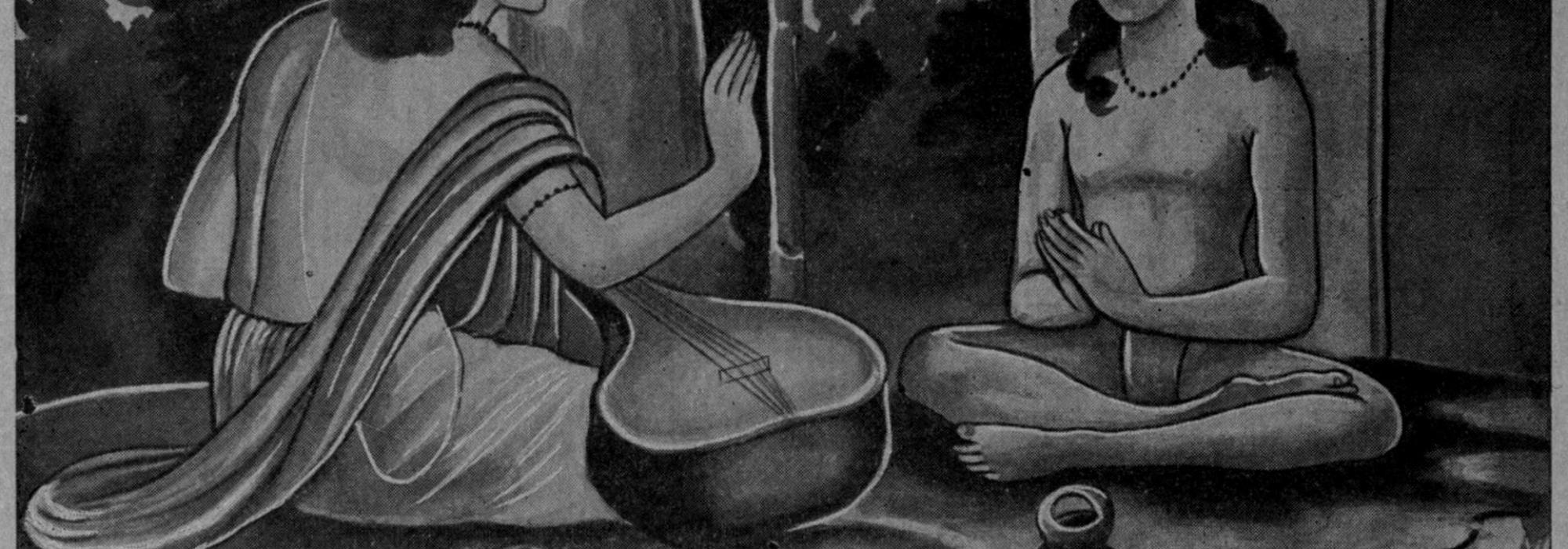अभिमानदम्भादिकं त्याज्यम् । ६४
64. Abandon pride, hypocrisy, etc.
तदर्पिताखिलाचारः सन् कामक्रोधाभिमानादिकं तस्मिन्नेव करणीयम् । ६५
65. Having offered all activities (to the Supreme) if (still troubled) by lust, anger, pride, etc. then offer them (to the Supreme) as well.
[The Bhagavad-Gita says, “Whatever you do, whatever you eat, whatever you offer in yajna (worship) or give as dana (charity) or give up as tapas (austerity), dedicate that to me.” (BG 9.27)]
त्रिरूपभङ्गपूर्वकम् नित्यदास्यनित्यकान्ताभजनात्मकं प्रेम कार्यं प्रेमैव कार्यम् । ६६
66. After the dissolution of the three forms – by means of constant service (to the Supreme) or by worshiping (the Supreme) as a spouse – cultivate love, indeed, cultivate love.
[Here, ‘three forms’ could either mean the trio of ‘worshiper, worshiped, and act of worship,’ or the three gunas – sattva, rajas, and tamas, or the three forms of secondary devotion.]
भक्ता एकान्तिनो मुख्याः । ६७
67. Bhaktas who have single-minded focus are preeminent.
[A ‘bhakta’ (devotee, loyal person, beloved) is a person who is endowed with bhakti.]
कण्ठावरोधरोमञ्चाश्रुभिः परस्परं लपमानाः पावयन्ति कुलानि पृथिवीं च । ६८
68. (Such bhaktas) have voices choked with emotion, hairs standing on end, and tears in their eyes as they converse with each other; (thus they) purify their clan as well as the earth.
तीर्थीकुर्वन्ति तीर्थानि सुकर्मी कुर्वन्ति कर्माणि सच्छास्त्रीकुर्वन्ति शास्त्राणि । ६९
69. (Such bhaktas) make pilgrimage spots more sacred, make actions nobler, and make shastras more meaningful.
[Alternatively, ‘Such bhaktas make ordinary places into pilgrimage spots, daily actions into noble deeds, and words of instruction into shastras.’]
तन्मयाः । ७०
70. They are one with That (the Supreme).
मोदन्ते पितरो नृत्यन्ति देवताः सनाथा चेयं भूर्भवति । ७१
71. (Upon the existence of such bhaktas,) ancestors rejoice, deities dance, and the earth gets a protector.
नास्ति तेषु जातिविद्यारूपकुलधनक्रियादि भेदः । ७२
72. (Among such bhaktas) there are no distinctions based on class, learning, appearance, family, wealth, profession, etc.
यतस्तदीयाः । ७३
73. They are of (the Supreme).
वादो नावलम्ब्यः । ७४
74. (A bhakta) should not be engulfed by discussions.
बाहुल्यावकाशत्वाद् अनियतत्त्वाच्च । ७५
75. (Discussions) can’t be decisive and (thus) there is a chance for excess.
भक्तिशास्त्राणि मननीयानि तदुद्बोधकर्माणि करणीयानि । ७६
76. Meditate on the treatises of bhakti and act in the spirit of bhakti.
सुखदुःखेच्छालाभादित्यक्ते काले प्रतीक्ष्यमाणे क्षणार्धमपि व्यर्थं न नेयम् । ७७
77. Don’t waste even half a second in expectation of the time when comfort, pain, wants, profits, etc. are renounced.
अहिंसासत्यशौचदयास्तिक्यादिचरित्राणि परिपालनीयानि । ७८
78. Adhere to the traits of non-injury, truth, cleanliness, compassion, faith, etc.
सर्वदा सर्वभावेन निश्चिन्तैर्भगवानेव भजनीयः । ७९
79. Always, with all your heart, without worries, worship the Supreme.
सङ्कीर्त्यमानः शीघ्रमेवाविर्भवत्यनुभावयति भक्तान् । ८०
80. Bhaktas who sing songs of praise quickly experience the Supreme.
त्रिसत्यस्य भक्तिरेव गरीयसी भक्तिरेव गरीयसी । ८१
81. Bhakti by means of the three truths is the greatest, is the greatest
[Here, ‘three truths’ refers to honesty in body, speech, and mind.]
गुणमाहात्म्यासक्ति-रूपासक्ति-पूजासक्ति-स्मरणासक्ति-दास्यासक्ति-सख्यासक्ति-
वात्सल्यसक्ति-कान्तासक्ति-आत्मनिवेदनासक्ति-तन्मयतासक्ति-परमविरहासक्ति-रूपा
एकधा अपि एकादशधा भवति । ८२
82. Bhakti is essentially one but exists in eleven forms; (bhakti is) interest in
– the greatness of the traits (of the Supreme)
– the form (of the Supreme)
– worship (of the Supreme)
– constantly remembering (the Supreme)
– serving (the Supreme)
– being a friend to (the Supreme)
– being a wife (to the Supreme)
– being a mother (to the Supreme)
– offering oneself (to the Supreme)
– becoming one (with the Supreme)
– being distressed at the separation (from the Supreme)
इत्येवं वदन्ति जनजल्पनिर्भयाः एकमताः कुमार-व्यास-शुक-शाण्डिल्य-गर्ग-विष्णु-
कौण्डिण्य-शेषोद्धवारुणि-बलि-हनुमद्-विभीषणादयो भक्त्याचार्याः । ८३
83. Thus, unafraid of people’s opposition, this (greatness of bhakti) has been said, in a single opinion by the great acharyas of bhakti like Sanatkumara, Vyasa, Shuka, Shandilya, Garga, Vishnu, Kaundinya, Shesha, Uddhava, Aruni, Bali, Hanuman, Vibhishana, etc.
य इदं नारदप्रोक्तं शिवानुशासनं विश्वसिति श्रद्धते स भक्तिमान् भवति सः प्रेष्टं लभते सः प्रेष्टं लभते । ८४
84. One who honors and believes in this teaching of Shiva, declared by Narada, becomes a great bhakta and attains the beloved, attains the beloved!
I'm grateful to Shatavadhani Dr. R. Ganesh for his review of my translation. The translations of the Gita are taken from The New Bhagavad-Gita, which I co-wrote with Dr. Koti Sreekrishna.















































